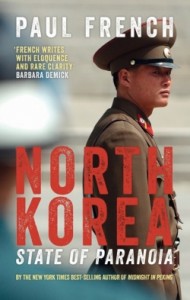Paul French, North Korea: State of Paranoia
Zed Books, 480pp, £12.99, ISBN 9781780329475
reviewed by Stephen Lee Naish
My Google news feed is often set as to prioritise news stories that emerge from the socialist wasteland that is the Democratic People’s Republic of Korea (DPRK), or North Korea as we refer to it in the West. The slow trickle of internal news and rumour, that comes sourced via China and South Korea’s gossip bloggers, and from more serious academics, can last for months at a time and provoke bursts of laughter at the absurdity of some of the content (a recent example, the discovery of a unicorn lair, was a howler). Often, however, these trickles can erupt into a full blown flood of reports that make international headlines and evoke serious responses from diplomatic envoys the world over. These reports on North Korea can be as frightening as they are bizarre. Take for example the March 2013 nuclear posturing from the North towards its southern half and the US — didn’t that feel like it was ripped out from some outdated Cold War novel? Yet the threat was real enough and continues to be.
The more recent excursions by former NBA star Dennis Rodman to train the North Korean basketball team and his budding bromance with the North Korea’s current leader, the young Kim Jong-un, seems like it should be the source material of some straight-to-DVD sports comedy. However weird and funny that may seem, in the following months major headlines reported that Kim Jong-un ordered the execution of Jang Song Thaek, his uncle by marriage and, until his public disgrace in the eyes of North Korea, a member of the ruling elite for decades. And much more recently we were informed that the government had ordered all North Korean males to adopt Kim Jong-un’s rather tragic hairstyle. If a country could win a prize for weirdness, North Korea would be a consecutive winner. What is truly shocking about North Korea is after all the human rights abuses, the out of date political doctrine, the nuclear posturing, the cult of personality, and the ability to antagonise its neighbours and the world, seemingly without much repercussion, North Korea still has the audacity to exist.
When American President George W. Bush namedropped North Korea alongside Iran and Iraq within his Axis of Evil, he began a re-emergence of interest in the nation that ranged from academics, political commentators and the general public alike, all wishing to delve further into this vague notion of evil. Thus began a publishing foray that has continued alongside the North’s own development. Ranging from sensationalist titles such as Micheal Breen’s Kim Jong-Il: North Korea’s Dear Leader (Wiley, 2004) and Rouge Regime: Kim Jong-Il and the Looming Threat of North Korea (Oxford University Press, 2006) to the more recent economic dissections of Victor Cha’s The Impossible State (Bodley Head, 2012), explorations of the regime’s propaganda machine in The Cleanest Race (Meville House, 2012), and the exposés of escapes from North Korea from Barbara Demick’s Nothing to Envy (Granta, 2010) and Escape from Camp 14 (Pan, 2013). In combination, these books offers a detailed picture of life and politics in North Korea, and frankly, it is pretty grim. Paul French’s new book North Korea: State of Paranoia is a courageous attempt to decipher the country’s past, present and future within one fairly digestible volume. Unlike some if its predecessors, the tone of the book remains realistic and evades sensationalism in order to portray an honest picture of North Korea in all its aspects.

